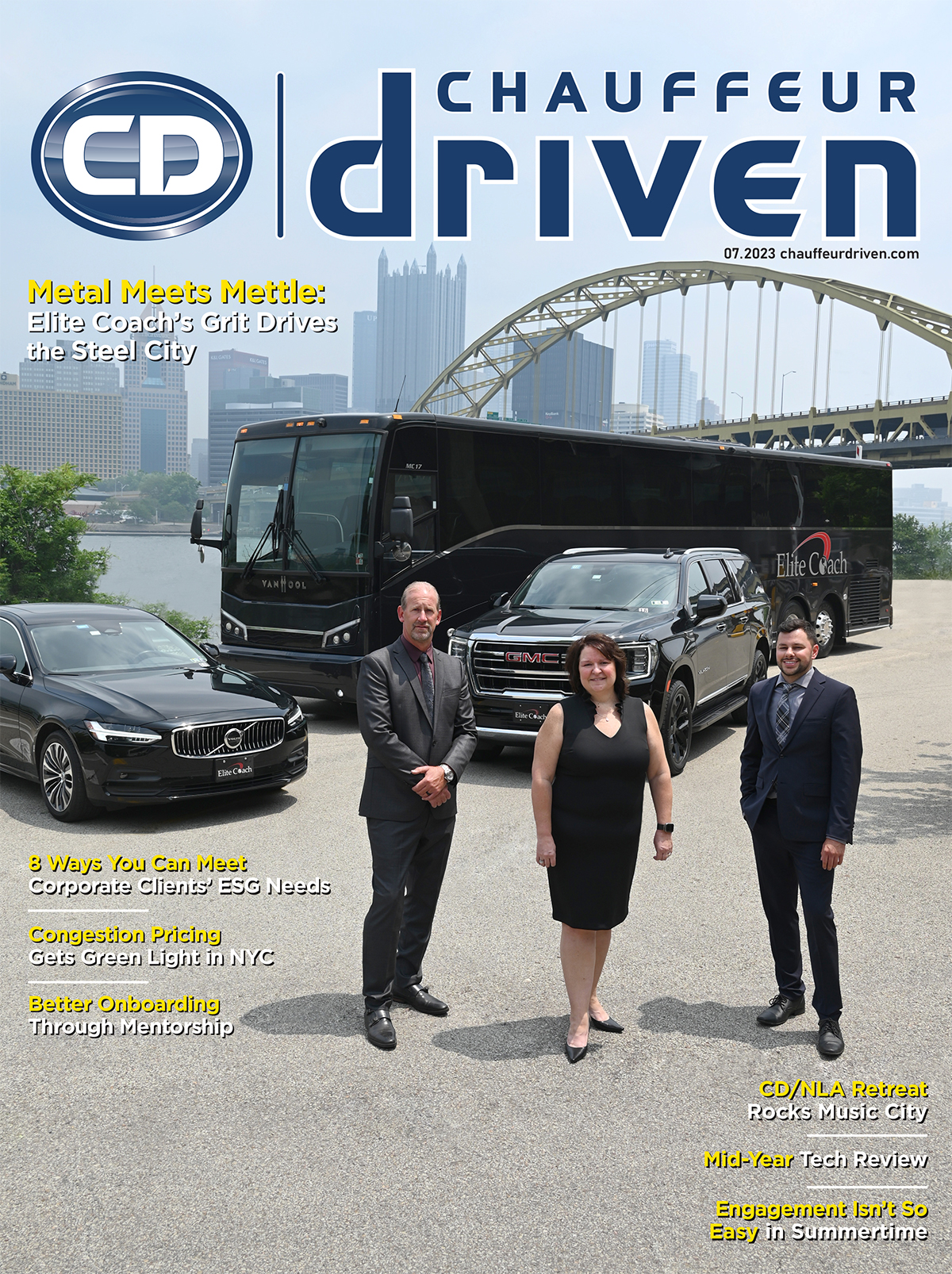 Cover Art: L to R: Elite Coach Transportation President Greg Feorene, VP & Partner Michelle Miller, and GM Mike Gibbon display some of their 80-vehicle fleet at Pittsburgh’s Fort Pitt Bridge. Photography by Chris Weiss.
Pittsburgh’s rebirth is a story of inspiration. For much of the 20th century, the Western Pennsylvania locale, ringed by mountains and blessed with natural beauty from the meeting of three major rivers, continued to be among the country’s most important industrial powerhouses. Juxtaposed with its working-class image, the thriving middle class enjoyed a cosmopolitan downtown with world-renowned educational institutions and posh galleries built by the titan of the steel industry, philanthropist Andrew Carnegie. When most of the steel mills finally faded away in the 1970s, many thought the haze-filled city had seen the end of its era.
Cover Art: L to R: Elite Coach Transportation President Greg Feorene, VP & Partner Michelle Miller, and GM Mike Gibbon display some of their 80-vehicle fleet at Pittsburgh’s Fort Pitt Bridge. Photography by Chris Weiss.
Pittsburgh’s rebirth is a story of inspiration. For much of the 20th century, the Western Pennsylvania locale, ringed by mountains and blessed with natural beauty from the meeting of three major rivers, continued to be among the country’s most important industrial powerhouses. Juxtaposed with its working-class image, the thriving middle class enjoyed a cosmopolitan downtown with world-renowned educational institutions and posh galleries built by the titan of the steel industry, philanthropist Andrew Carnegie. When most of the steel mills finally faded away in the 1970s, many thought the haze-filled city had seen the end of its era.
But a generation later, Steel City is living up to its strength and resiliency. Now known more for its championship-winning sports teams like the Steelers, Penguins, and Pirates than its legacy of iron ore and coal, industry has been replaced by life sciences, finance, and critically, technology. The inflow of venture capital, especially for these tech startups, has bolstered other area businesses of all sizes. Practically every US city is striving to be the next Silicon Valley, and there are certainly plenty of headlines claiming that Pittsburgh is “the one.” However, being a powerhouse of knowledge, innovation, and connectivity—a throwback to its roots—is leading Pittsburgh’s next chapter.
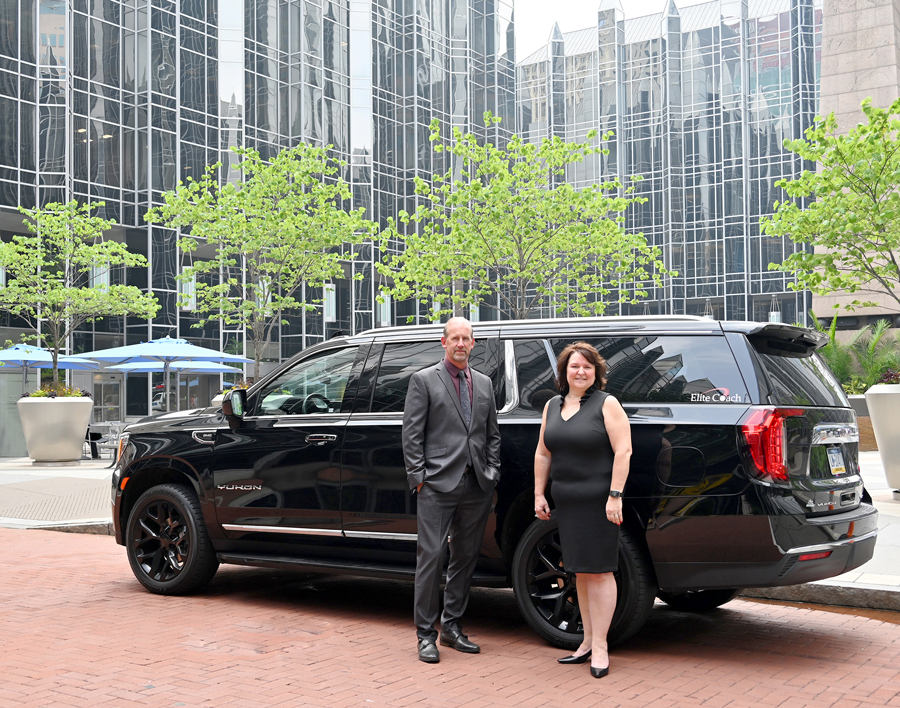 Greg Feorene and Michelle Miller at PPG Place, one of the city’s iconic skyscrapers
Like its hometown of 31 years, Elite Coach Transportation is also experiencing a renaissance of their own for a bevy of reasons, mirroring the tremendous strides their community has seen in even the past few years. Founded in 1991 by President Greg Feorene, and now co-run with Vice President & Partner Michelle Miller, Elite has ridden the economic waves in the past three decades, often growing stronger on the other side. In the past two years alone, Elite’s fleet has expanded to 80, up more than a dozen since 2021, and it’s becoming more diverse too beyond the usual sedans, SUVs, and Sprinters (but more Volvos are on order). Whereas retail work once dominated, new market sectors like corporate and employee shuttles have become a vital part of their portfolio mix.
Greg Feorene and Michelle Miller at PPG Place, one of the city’s iconic skyscrapers
Like its hometown of 31 years, Elite Coach Transportation is also experiencing a renaissance of their own for a bevy of reasons, mirroring the tremendous strides their community has seen in even the past few years. Founded in 1991 by President Greg Feorene, and now co-run with Vice President & Partner Michelle Miller, Elite has ridden the economic waves in the past three decades, often growing stronger on the other side. In the past two years alone, Elite’s fleet has expanded to 80, up more than a dozen since 2021, and it’s becoming more diverse too beyond the usual sedans, SUVs, and Sprinters (but more Volvos are on order). Whereas retail work once dominated, new market sectors like corporate and employee shuttles have become a vital part of their portfolio mix.
“We’re this huge gamut of all different kinds of transportation right now, and I want to say we wouldn’t be as effective as we are without our partners here in the city. All of the companies in Pittsburgh feel that we are very close and we can help each other. The reason we keep growing is because our affiliates are pushing us in that direction. Our partnerships with these local companies have been a huge part of moving us forward in 2023, and we value those relationships very, very strongly,” says Miller.
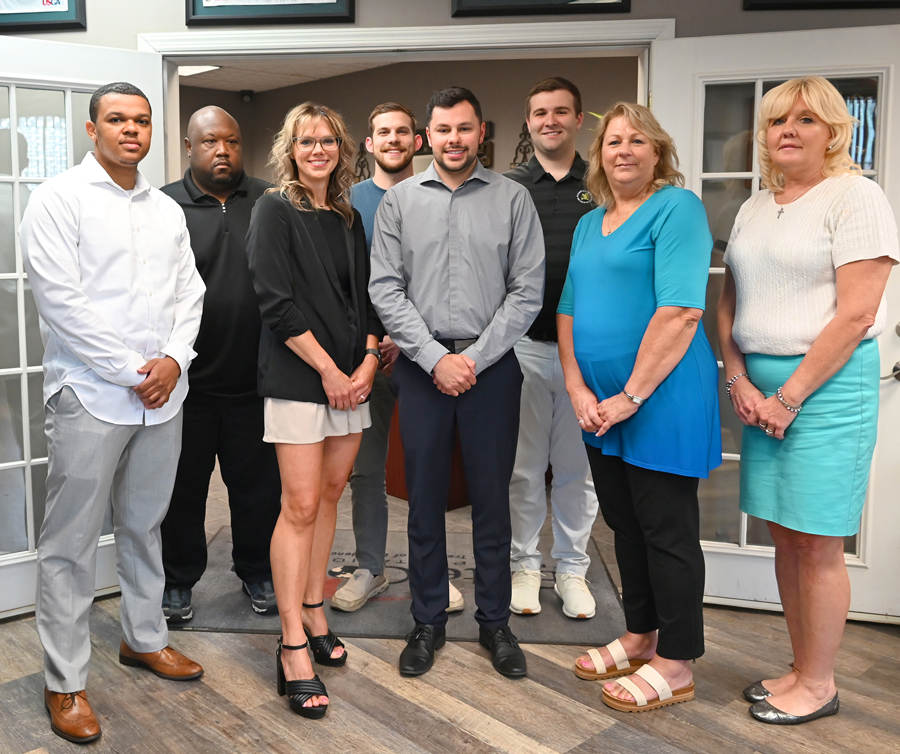 Above (L to R): Dispatcher Myron Taylor, Inside Sales James Garner, Corporate/Wedding Specialist Lori Feorene, Inside Sales Calvin Barton, General Manager Mike Gibbon, Inside Sales David Hanno, Corporate Assistant Karen Gray, and Accounting Associate Darla Warburton
Elite’s flexible fleet has been a constant driver of their continued success, starting with their adoption of shuttle buses and motorcoaches back in 2003—well before many of their peers stepped outside of “traditional” limousine vehicles. Miller says that their midsize buses like their 38-40 passengers (and often their 56 passengers) are currently seeing the most appeal across a broad spectrum of customers and services. Shuttles that can be used for their more recent work like school and university transportation during the day also attract those attending concerts or sporting events at night or on weekends ... and make no mistake, Pittsburgh is a sports town through and through.
Above (L to R): Dispatcher Myron Taylor, Inside Sales James Garner, Corporate/Wedding Specialist Lori Feorene, Inside Sales Calvin Barton, General Manager Mike Gibbon, Inside Sales David Hanno, Corporate Assistant Karen Gray, and Accounting Associate Darla Warburton
Elite’s flexible fleet has been a constant driver of their continued success, starting with their adoption of shuttle buses and motorcoaches back in 2003—well before many of their peers stepped outside of “traditional” limousine vehicles. Miller says that their midsize buses like their 38-40 passengers (and often their 56 passengers) are currently seeing the most appeal across a broad spectrum of customers and services. Shuttles that can be used for their more recent work like school and university transportation during the day also attract those attending concerts or sporting events at night or on weekends ... and make no mistake, Pittsburgh is a sports town through and through.
“Customers can get us on the phone, and that’s always been the case. We’re not just managing the business, we are in the business, which gains us a lot of respect.” – Michelle Miller, Vice President & Partner of Elite Coach TransportationIt’s also been quite the season for concerts, according to Miller. While hundreds of artists have planned dates at various city venues this summer and fall—everyone from Ed Sheeran to Eric Church—nothing will likely top the mid-June stop by Taylor Swift. The bidding war for tickets reached the tens of thousands of dollars, with fans reportedly traveling up to 13 hours to attend. More so, the headline-topping concert was also a record-breaking one for Acrisure Stadium with more than 73,000 attending one of the two nights. And you can bet that Elite was a part of getting those Swifties to and from, not to mention the regular work they have with locations like the Benedum Center and the Pittsburgh Symphony Orchestra.
Convention business has also ticked up recently, soliciting visitors from around the world to Western Pennsylvania—and from the mainstream to the political to the bizarre, they’re bringing their spending power too. It’s expected to be a solid revenue year for large and small businesses alike that are thriving with the return of events. Operators from outside of Pittsburgh are keen to work with companies like Elite to handle their traveling clients.
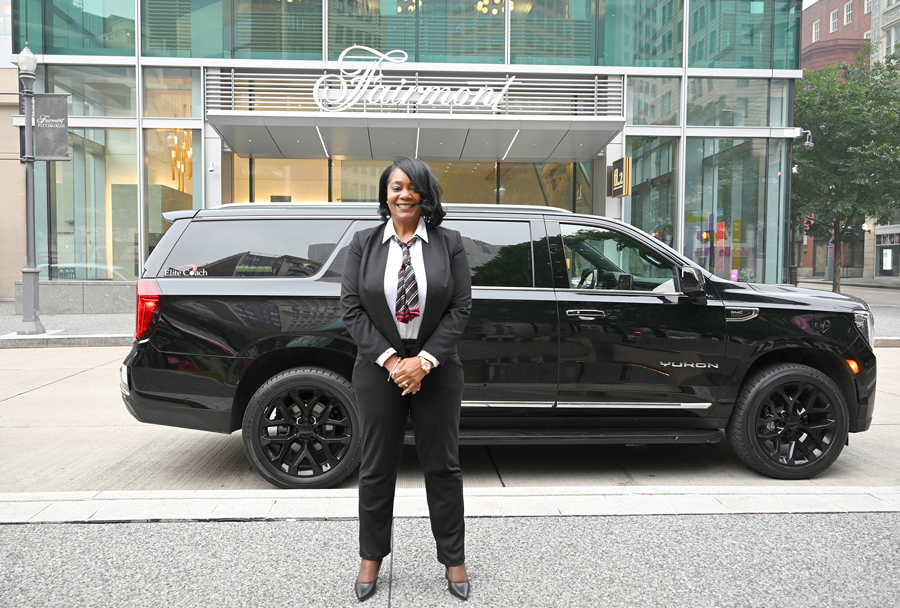 Chauffeur Rhonda Bentley at the Fairmont Pittsburgh
“We did very little affiliate work from outside the area [prior to the pandemic]. And now it seems like we’re getting a flood of affiliate work with our partners across different states, who are entrusting us with their customers, which is another partnership that’s pushing us forward. And you know, we’re excited for those relationships,” says Miller.
Chauffeur Rhonda Bentley at the Fairmont Pittsburgh
“We did very little affiliate work from outside the area [prior to the pandemic]. And now it seems like we’re getting a flood of affiliate work with our partners across different states, who are entrusting us with their customers, which is another partnership that’s pushing us forward. And you know, we’re excited for those relationships,” says Miller.
A personal goal, Miller would also consider branching out into areas that are traditionally handled by the public sector. After seeing firsthand how difficult it is for the special needs community to navigate city-provided transportation—including lengthy wait times and lack of on-demand capabilities—she sees the potential for improvement by working with private companies like Elite.
Metal has certainly had an impact on Elite’s most recent gains, but so too has the team’s mettle—trying new things, exploring new avenues, and reaching to be that much better than yesterday without losing sight of the important things that keep happy customers returning.
“To be honest, we do very little advertising outside of bridal and industry events, but beyond word of mouth, our cars are the billboards that drive around the city and that’s how people find us,” says Miller. “I also think it’s our tight-knit management staff who aren’t untouchable. Customers can get us on the phone, and that’s always been the case. We’re not just managing the business, we are in the business, which gains us a lot of respect in our industry as well as with the local companies that see us out there doing it.”
Pittsburgh is technically classified as a midsize city, but in many ways its economic engine is powered like a population center a fraction of its size. Collaborating with like-minded businesses matters wherever you operate, but it feels a little extra important in a city that is evolving not only economically but demographically.
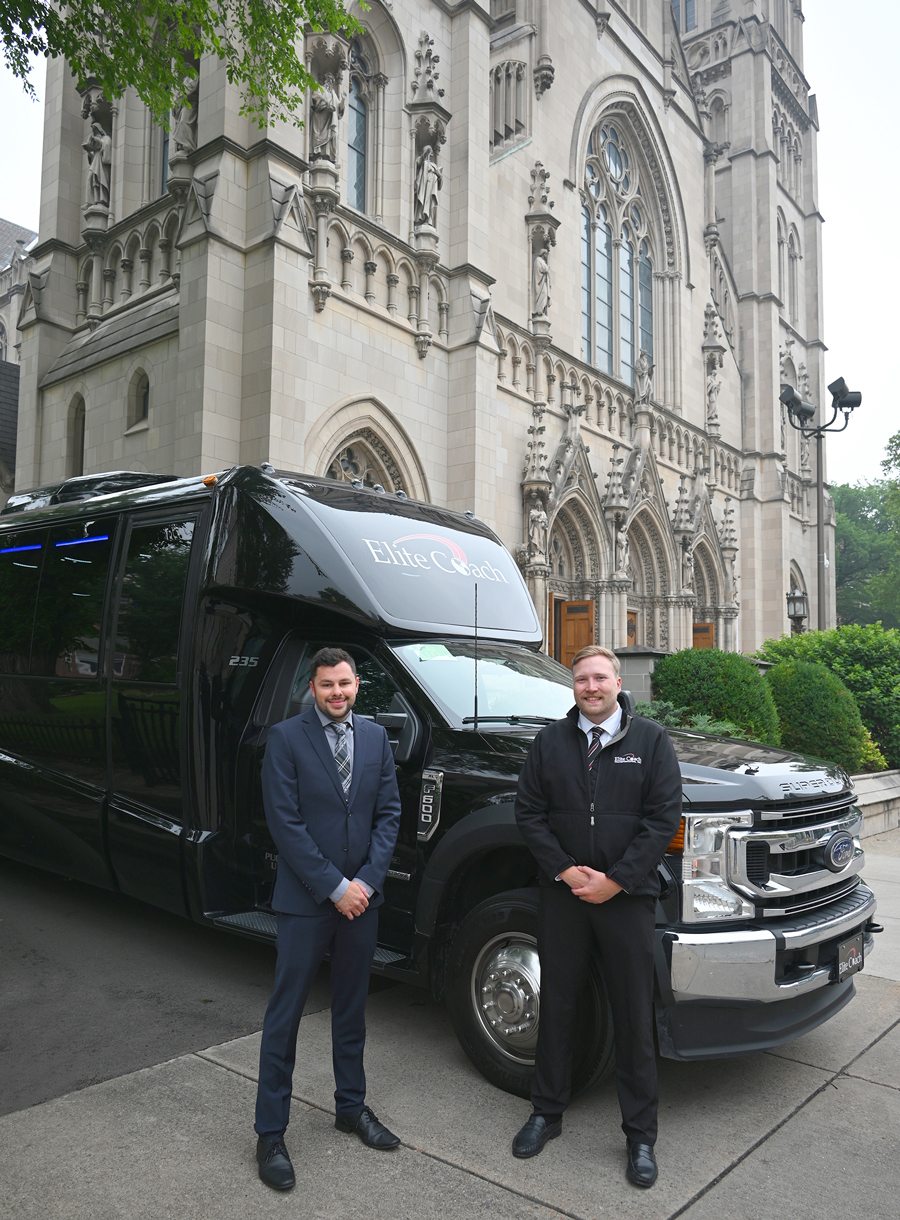 Mike Gibbon (left) with Chauffeur Randy Laue at Heinz Memorial Chapel
One of those sectors where partnerships have flourished is the wedding industry. Elite has been a part of area weddings for decades, so to be named the exclusive transportation provider by numerous top wedding planners in the city was quite the feather in their cap, according to Miller.
Mike Gibbon (left) with Chauffeur Randy Laue at Heinz Memorial Chapel
One of those sectors where partnerships have flourished is the wedding industry. Elite has been a part of area weddings for decades, so to be named the exclusive transportation provider by numerous top wedding planners in the city was quite the feather in their cap, according to Miller.
Thriving technologies like robotics are attracting many young and educated professionals to the area at a time when the population is aging. Elite is benefiting from this influx of younger talent as well—when the industry is equally maturing. Moreover, Elite leadership is listening to them and learning from the fresh ideas and generational insights that they bring with them, but with steady and seasoned guidance.
Miller admits that it wasn’t necessarily easy at first.
“I stopped thinking that I knew best and instead leaned on them to tell me what their generation has seen and what they are looking for. Are we attracting them to work here? Well, I had to let them be among the decision makers with Greg and I as resources, because I think they want to work hard and they are a part of a team. They like being involved rather than me just telling them the price—they even make it a competition to see who’s closer. We’ve been teaching them as much as they’re teaching us.”
Many operators have extolled the effect that apps like Uber and Lyft have had on the industry. Once seen as rule-breaking foes, the deleterious reputation of rideshares has offered at least one benefit: by making chauffeured transportation more accessible to everyone beyond proms and weddings. However, it has also led to different challenges and changing expectations, one where companies must always be ahead of the curve to predict what their customers will want tomorrow. The “wow” factor of a flashy vehicle arriving to whisk them away is mostly gone because Millennials and Gen Z have either already seen it on social media or experienced it themselves in the corporate world, so now they have different wants from transportation ... and it’s usually technology related.
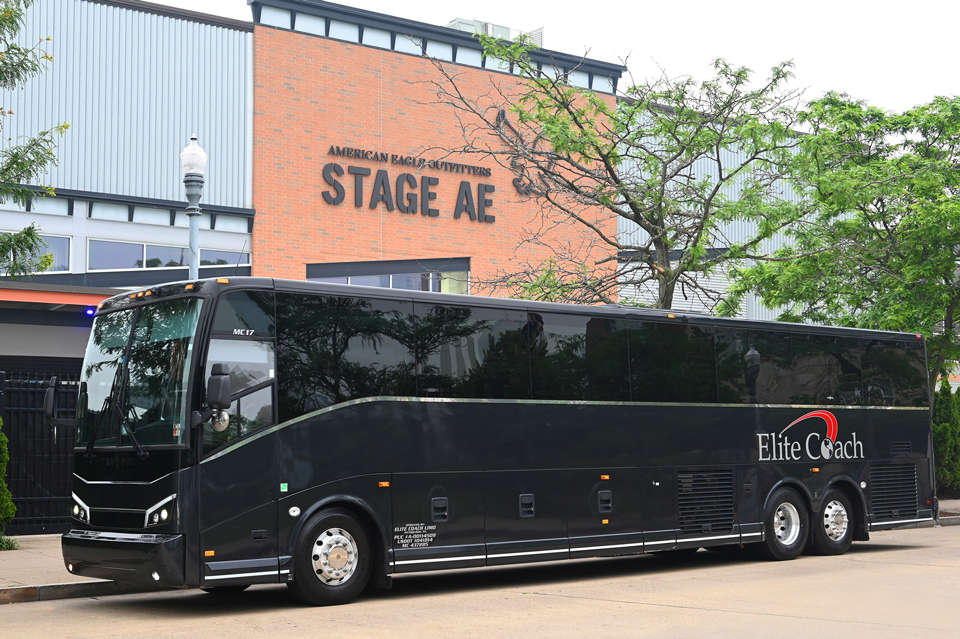 One of Elite’s motorcoaches at event venue Stage AE
Managing the various generational asks has been the focus for staff like General Manager Mike Gibbon. At 29, he’s not only a Millennial but among the youngest members of Elite’s management team. He began working for the company in high school washing cars and quickly rose through the ranks to his current position in logistics and operations.
One of Elite’s motorcoaches at event venue Stage AE
Managing the various generational asks has been the focus for staff like General Manager Mike Gibbon. At 29, he’s not only a Millennial but among the youngest members of Elite’s management team. He began working for the company in high school washing cars and quickly rose through the ranks to his current position in logistics and operations.
“I think service has gotten more demanding across all of the service industries,” says Gibbon. “It’s partially a generational shift because we’ve grown up with these things at our fingertips, with everything on demand, so we’ve gotten pickier. To some extent it can be brutal, especially the way some react to something minor like it’s the end of the world and are so quick to write a complaint or demand their money back. They still want the clean car and the nice chauffeur, but they want more. We make sure that we dot every I and cross every T.”
Among the top “deal-breakers” Gibbon has heard from his customers: connectivity.
“I swear, the bus could be an hour late for a pickup and it would be less of a big deal than somebody not being able to play their phone’s playlist or having to listen to the radio,” Gibbon jokes. “You have to pay attention to your clients and recognize patterns of their common issues and try to eliminate those concerns altogether before they reach them. So, our precheck list includes testing to ensure that the AC is cold, and we clear previous customers’ phones from Bluetooth in every vehicle so they can quickly connect. It’s these little things that we act on so that they’re a non-issue in the future for everyone.”
If there’s any trend that’s topping the list in 2023, it’s AI: It’s been exploding across the business world and touching practically every industry. Gibbon thinks it could be useful for chauffeured transportation, but with limits.
“It’s interesting and something that could be beneficial to us and just about everything. It can be helpful as a time saver to eliminate a lot of wasted time and labor costs, but I don’t think it’s the perfect answer. When you’re looking at weddings and detailed itineraries, you’re going to need a human face to make sense of it. AI will be a tool, but you’re still going to need a person somewhere at the helm making the decisions,” he says.
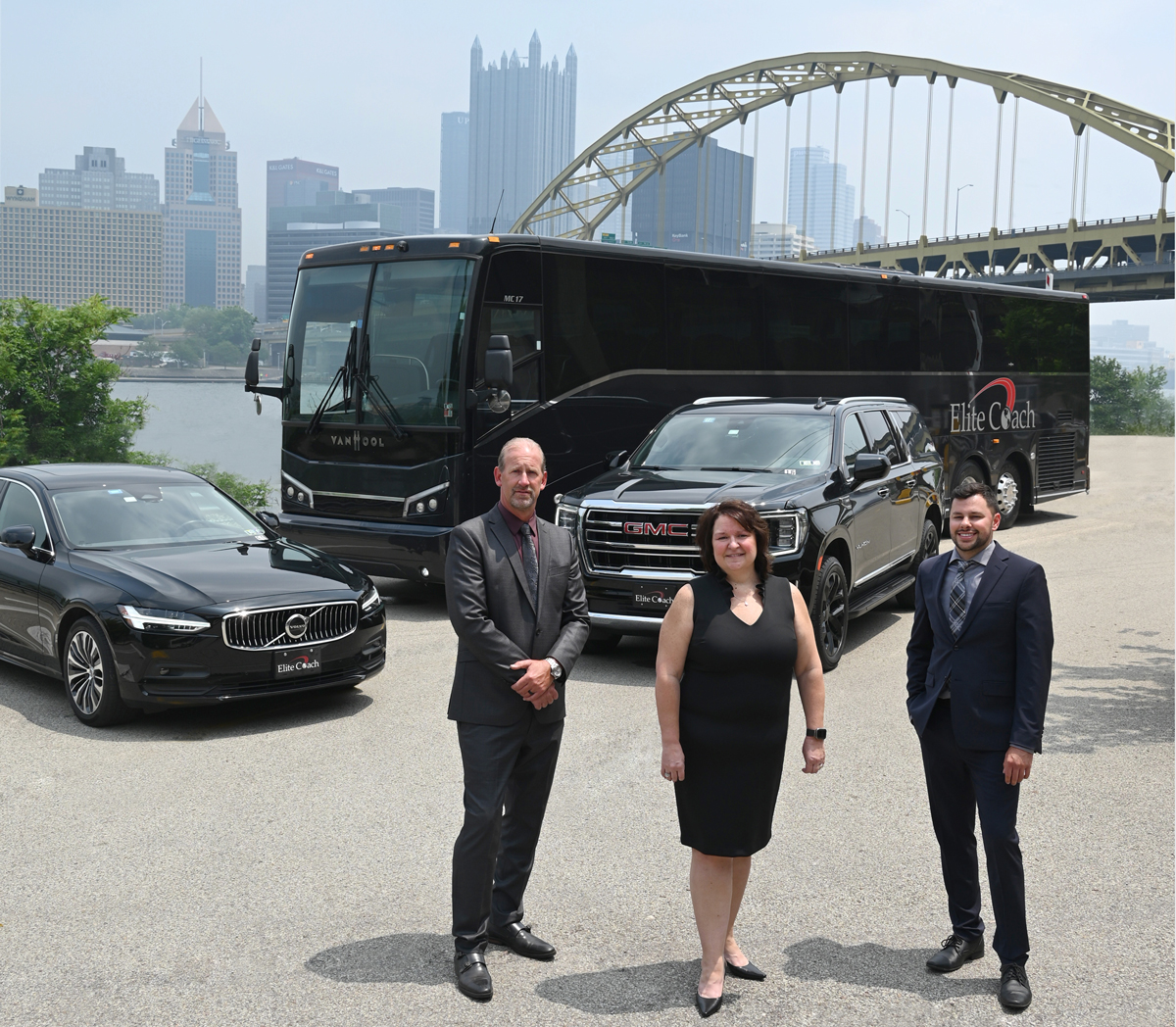 L to R: President Greg Feorene, Vice President & Partner Michelle Miller, and General Manager Mike Gibbon at the Fort Pitt Bridge overlooking downtown Pittsburgh
While technology has its many advantages, it’s no substitute for customer service. “Sometimes you just need to pick up the phone,” says Miller. “Whatever is happening can be handled in five minutes instead of hours going round and round by text. It doesn’t have to be this frustrating.”
L to R: President Greg Feorene, Vice President & Partner Michelle Miller, and General Manager Mike Gibbon at the Fort Pitt Bridge overlooking downtown Pittsburgh
While technology has its many advantages, it’s no substitute for customer service. “Sometimes you just need to pick up the phone,” says Miller. “Whatever is happening can be handled in five minutes instead of hours going round and round by text. It doesn’t have to be this frustrating.”
Miller recalls a recent situation where a longtime customer did pick up the phone.
“The customer called and said, ‘I’ve been using you guys for now over 25 years, and I can tell you how great your service is, but I had a really bad experience with a recent driver.’ I was thankful for the call so I could apologize and fix the situation. Problem solved. At the end of the conversation, he said, ‘I waited three weeks before I made this call. But the more I thought about it, the more I want you guys to be here for another 30 years. What happens if somebody else doesn’t call and then something happens?’ It was kind of very heartwarming to know that he wasn’t looking to get a refund and he didn’t fire off a horrible review online. He was calling because he knew we wouldn’t accept this from a driver and was comfortable enough to tell us, because we’re not perfect. It’s those types of people who have gotten us where we are today.” To thank him, she sent him a gift card for a local business he enjoys.
As fast as the world is transforming today, Miller reflects on Elite’s humble beginnings as a two-car operator in the ’90s when they were the younger, ambitious leaders building a company while balancing the abundant emerging trends of the time.
“Sometimes I wonder if smaller operators read these profiles and think that it’s obtainable. We started with two cars, then we had 15 cars, and then we slowly built up to where we are. We’re not better than anyone else, and the sky is the limit for any company out there,” says Miller. “But it all comes down to who you have in the building, and if they have the passion and the drive to keep pushing forward. Greg and I are getting older, so it really is our employees who will get us to wherever it is we go next. We want to thank our entire team and we are excited to see what the future brings.” [CD0723]

